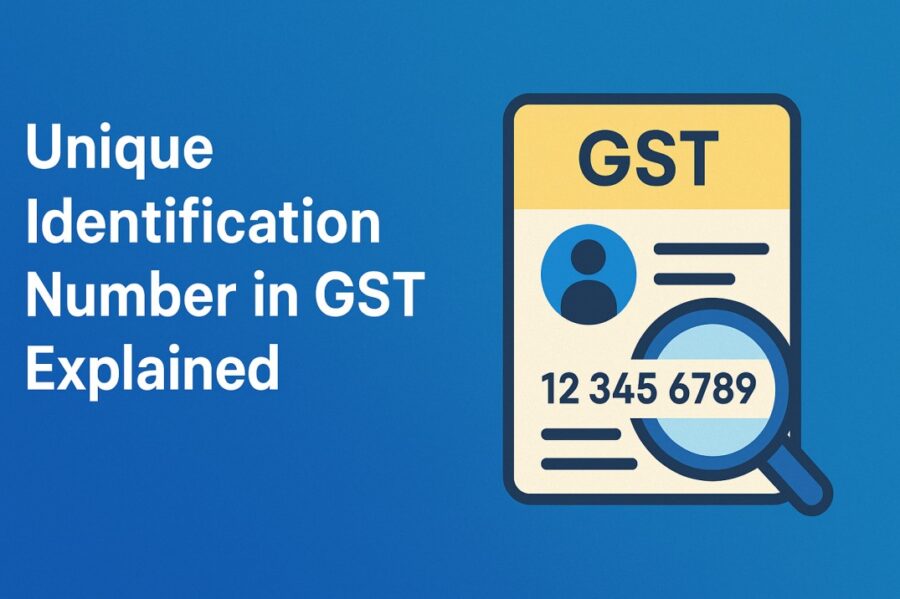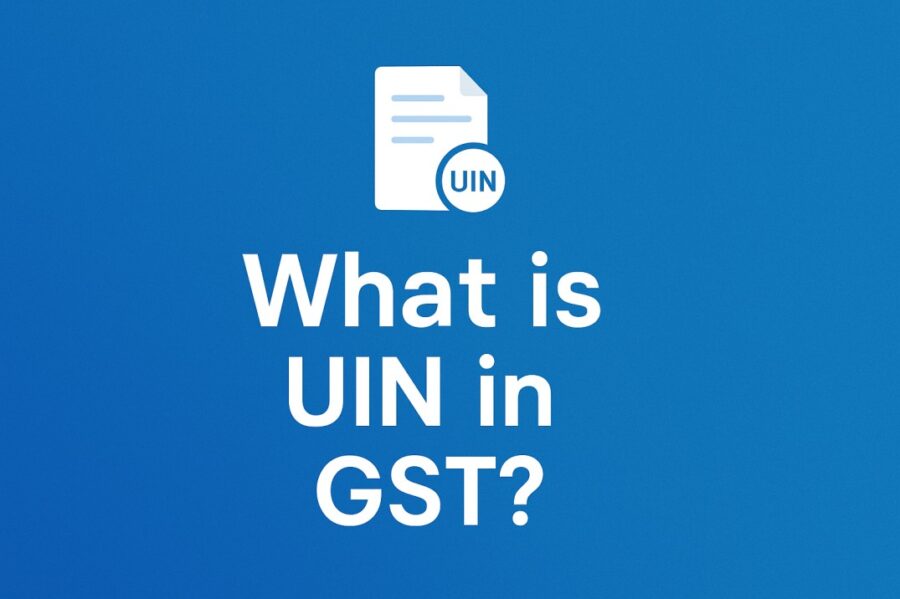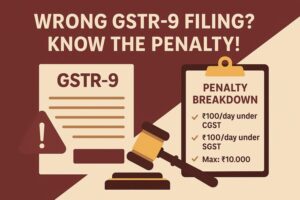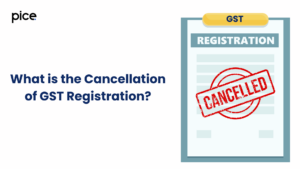Unique Identification Number in GST Explained
- 23 Oct 25
- 8 mins

Unique Identification Number in GST Explained
Key Takeaways
- UIN in GST is a 15-digit unique identification number issued to embassies, UN bodies, and notified agencies for tax exemption and refund claims.
- Organisations apply for UIN under GST using Form GST REG-13, submitting required documents like authorisation letters and signatory details.
- UIN holders can claim refunds of GST paid on inward supplies by filing refund application Form GST RFD-10 with valid invoices.
- The Unique Identification Number in GST simplifies refund processing, ensures tax exemption, and supports India’s international agreements.
- Maintaining accurate purchase records and timely refund claims is mandatory for UIN holders to remain compliant under GST regulations.
The Goods and Services Tax framework in India includes special provisions for specific organisations as well. These special organisations include embassies, United Nations bodies and other notified agencies. These organisations do not need to pay taxes like regular taxpayers. However, they still need a registration mechanism to claim tax refunds.
Thus, the government issues a Unique Identification Number in GST. This article will explain to you all about UIN, its purpose, importance, application process, benefits, and more under the GST system.
What is UIN in GST?

UIN, or Unique Identity Number, which replaces the usual GSTIN (Goods and Services Tax Identification Number). It is a number provided to a few specified individuals as a unique registration number to use for their taxation process.
All of these individuals who are entitled to have a unique identification number in GST are organisations or people who do not make outward supplies that are taxable at all. Therefore, the reason behind granting UIN to them is so they can refund the taxes that have been paid on all of their inward supplies.
Thus, to make this process standard, they receive a UIN instead of a GSTIN. They can use them later to claim a refund on all of the taxes they have paid. The structure of a UIN is as same as a GSTIN, and it is also a 15-digit code.
Why Is UIN Important?
The Indian government issues a unique identification number in GST to allow tax exemption for organisations. They do it so these organisations can claim refunds as per international agreements or diplomatic immunity.
By providing a UIN, the government enables these institutions to operate without bearing the burden of indirect taxes. This honours their international commitments and supports strong diplomatic relations.
Who is a UIN Holder in GST?
The specific individuals or specialised agencies who have or are holders of a unique identification number in GST are as follows:
- Foreign embassies or consulates
- Any individual informed by the Commissioner
- Any special agency of the UN (United Nations) organisation or a multilateral financial institution, and an institution informed under the UN’s (Privileges and Immunities) Act, 1947. For instance WHO, IMF, UNESCO, and more
How to Apply for a UIN?

To obtain a UIN, an organisation that is applying needs to submit the GST REG-13 form through the GST portal. Applicants must complete this form with accurate details and follow a pre-defined process. Once the authorities verify their submission, they issue a unique identification number in GST to the eligible entity.
The steps to this pre-defined process are as follows:
Step 1: Prepare Required Documents
Applicants need to collect relevant documents, which include an authorisation letter, the authorised signatory’s identity proof and information regarding the entity’s operations.
Step 2: Fill GST REG-13 Form
Applicants must enter details in the GST REG-13 Form which comes in two parts: Part A and Part B.
Part A comprises basic information such as:
- Entity’s name
- Permanent Account Number of entities, if applicable
- Name of the authorised signatory
- Permanent Account Number of authorised signatories, if applicable
- Authorised Signatory’s E-mail ID
- Mobile number of the authorised signatory
Part B comprises additional information such as:
- Address of the entity for whom a centralised Unique Identification Number is issued
- Authorised Signatory information, such as name, father’s name, DoB, designation, mobile number, e-mail ID and residential address
- Bank account information, such as account number, type of account, IFSC, bank name and branch address
The application in Form GST REG-13 should be signed using either Digital Signature Certificates (DSC) or Electronic Verification Codes (EVC) after filing it.
Step 3: Submit the Application
Applicants then need to upload the completed form along with the necessary documents on the GST portal for further processing.
Step 4: Verification and Approval
Finally, GST officials examine the application. After successful verification of the attached documents, they approve the request. Thus, issuing the UIN to the applicant.
How Does the UIN Work?
A UIN holder can use it to claim refunds for the tax they paid on their purchase. This whole process of claiming refunds with the use of a unique identification number in GST involves:
- Making Purchases: This is where the UIN holder buys services or goods for use in their official business.
- Collecting Tax Invoices: While purchasing the services or goods, it becomes the responsibility of the UIN holder to collect appropriate tax invoices. This will help them to prove their spending on purchases.
- Filing Refund Claims: Periodically, a UIN holder can apply for refunds by submitting GST RFD-10. GST RFD-10 is a refund application which they can use. Along with filing this application, a UIN holder also needs to make sure that they provide the necessary documents and invoices.
- Receiving Refunds: After successful verification of the GST refund application, the tax authorities process it. This amount is then credited to the bank account of the UIN holder.
Benefits of the UIN

A Unique identification number in GST provides multiple benefits to the UIN holder. These benefits include:
- Tax Exemption: Since all of the UIN holders are exempt from the Indian GST regime, it helps them to operate in a more streamlined way without the burden of any extra costs.
- Simplification of Refund Process: This system of refund makes the process of claiming a refund on the taxes they have paid for their purchases easier for all UIN holders.
- Support for International Relations: The tax exemption that is provided to international and diplomatic bodies helps India strengthen the diplomatic relations it has with several countries by following international agreements.
Compliance Requirements for Obtaining UIN
Although UIN holders enjoy tax exemptions from the Indian GST regime, this facilitation comes with certain conditions that they need to fulfil. These compliance requirements are as follows:
- Maintenance of accurate records for all of the purchases made in the past, along with a record of the taxes paid
- Filing refund claims on time
- Cooperating with Indian GST authorities in case they are conducting any verifications and audits
If a UIN holder is not compliant with any of these conditions, it can result in delays or denials of refunds. Thus, it is essential for all UIN holders to stay diligent and informed in the process of filing and record-keeping.
Conclusion
By issuing a Unique Identification Number in GST, the Indian government makes sure that there is transparency and accountability for organisations that need tax exemption. UIN helps eligible organisations claim refunds efficiently while maintaining proper records within the GST system.
Thus, understanding the role of UIN is important for smooth tax compliance and benefiting from India’s tax system.
💡If you want to streamline your payment and make GST payments via credit, debit card or UPI, consider using the PICE App. Explore the PICE App today and take your business to new heights.
FAQs
What is UIN in GST?
Who is eligible to apply for a UIN under GST?
How can an organisation apply for UIN in GST?
How does a UIN holder claim a GST refund?
What compliance requirements must UIN holders follow?
Maintain accurate records of all purchases and taxes paid
File refund claims within prescribed timelines
Cooperate with GST authorities during verification or audits
Failure to comply can delay or deny refund claims, making compliance crucial for smooth refund processing.
 By
By 
















